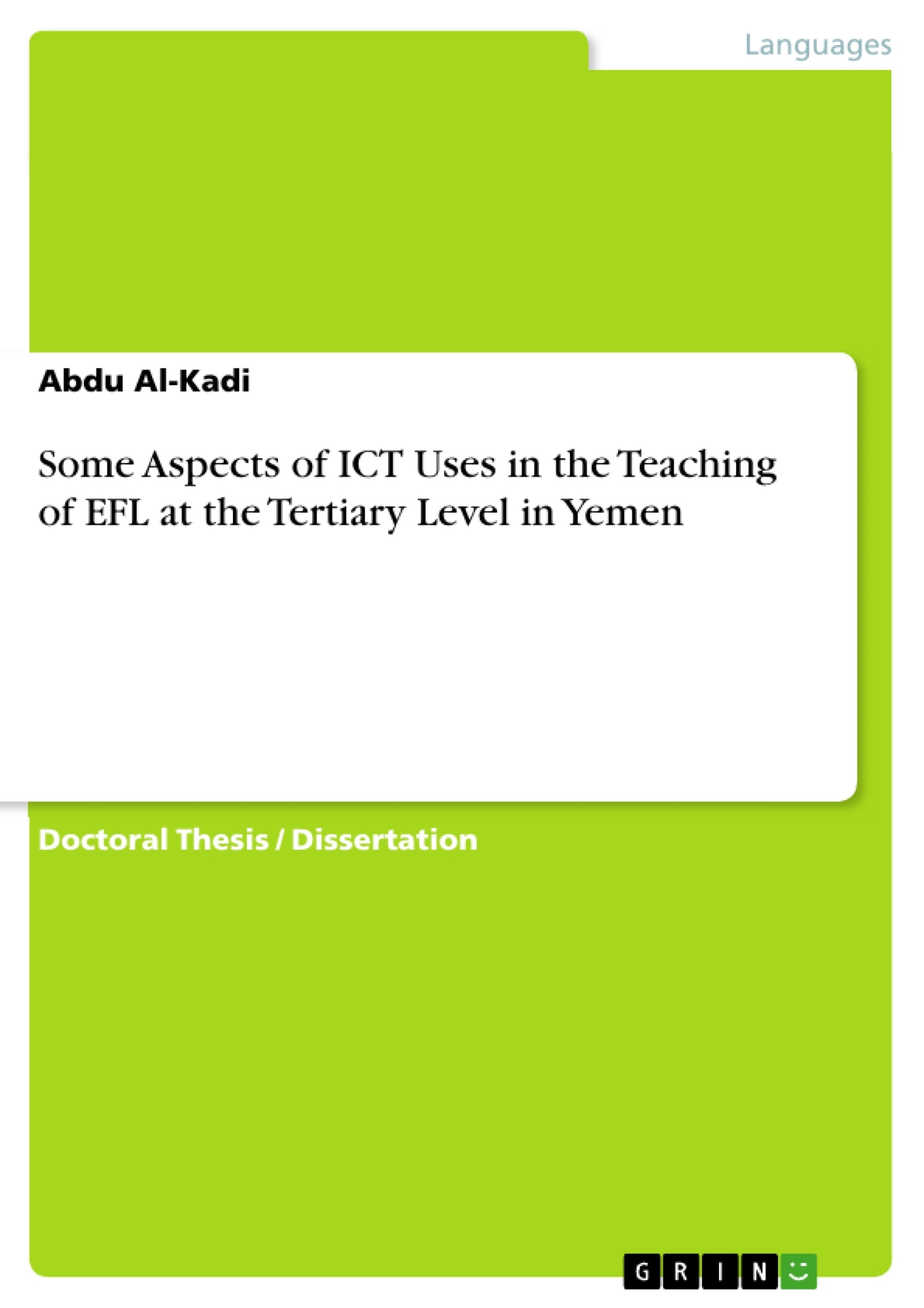This dissertation intended to (a) elucidate, through a mixed-method research design, how the university EFL learners and teachers utilize available ICT tools/applications and (b) measure the impacts of this usage on the learners’ proficiency and academic achievements. Data were collected in three phases: surveys, tests, and observations. The sample consisted of 428 senior students, 40 EFL teachers, and 10 head teachers, recruited from five public universities in Yemen. Of this initial cohort, 131 students were singled out for performance analysis. Again, within this subsample, 20 informants were kept under observation. Two types of data (quantitative and qualitative) were collected. The quantitative data were analyzed by applying appropriate descriptive and inferential statistics by using SPSS. Qualitative data were analyzed subjectively, establishing patterns and categories. Results indicated that most of the ICTs were used on an ad hoc basis. While there were no statistically significant impacts of using ICT on the learners’ performance, the respondents hold the view that such appliances offer some opportunities for engagement, interactivity, and motivation to learn English formally and informally. The findings brought to the foreground some pedagogic and linguistic implications and useful points for further research.
Inhaltsverzeichnis (Table of Contents)
- Abstract
- ملخص الدراسة (Abstract in Arabic)
- Declaration
- Acknowledgements
- Chapter One: Introduction
- 1.1 Background to the study
- 1.2 Statement of the problem
- 1.3 Research questions
- 1.4 Objectives of the study
- 1.5 Significance of the study
- 1.6 Scope and delimitation
- 1.7 Definitions of key terms
- 1.8 Organization of the dissertation
- Chapter Two: Review of Related Literature
- 2.1 Introduction
- 2.2 The concept of ICT
- 2.3 The history and evolution of ICT in education
- 2.4 The impact of ICT on education
- 2.5 Benefits and challenges of ICT integration in education
- 2.6 ICT use in the teaching of EFL: A global perspective
- 2.7 ICT use in the teaching of EFL in Yemen
- 2.8 Conclusion
- Chapter Three: Methodology
- 3.1 Introduction
- 3.2 Research design
- 3.3 Population and sample
- 3.4 Data collection instruments
- 3.5 Data collection procedures
- 3.6 Data analysis
- 3.7 Ethical considerations
- 3.8 Conclusion
- Chapter Four: Findings and Discussion
- 4.1 Introduction
- 4.2 ICT use in the teaching of EFL: A learner perspective
- 4.3 ICT use in the teaching of EFL: A teacher perspective
- 4.4 ICT use in the teaching of EFL: An administrator perspective
- 4.5 The impact of ICT use on EFL learners' proficiency
- 4.6 The impact of ICT use on EFL learners' academic achievement
- 4.7 Discussion of findings
- 4.8 Conclusion
- Chapter Five: Conclusions and Recommendations
Zielsetzung und Themenschwerpunkte (Objectives and Key Themes)
The dissertation aims to explore the utilization of Information and Communication Technology (ICT) tools and applications by EFL learners and teachers in Yemeni universities and to evaluate the impact of this usage on learners' language proficiency and academic achievement. The study employs a mixed-method research design, gathering data through surveys, tests, and observations.
- Impact of ICT integration on EFL learners' proficiency and academic achievement in Yemeni universities
- Examination of ICT usage patterns among EFL learners, teachers, and administrators in Yemen
- Analysis of the potential benefits and challenges associated with ICT integration in EFL education
- Exploration of the factors influencing the effectiveness of ICT implementation in Yemeni universities
- Identification of recommendations for improving ICT integration strategies in EFL education in Yemen
Zusammenfassung der Kapitel (Chapter Summaries)
The dissertation is organized into five chapters, covering the introduction, literature review, methodology, findings and discussion, and conclusions and recommendations.
- Chapter One: Introduction provides the background for the study, outlines the research problem, formulates research questions, sets objectives, and highlights the significance of the study. It also details the scope and delimitation of the research and defines key terms.
- Chapter Two: Review of Related Literature explores the concept of ICT, its historical development in education, and its impact on educational practices. The chapter also examines the benefits and challenges of ICT integration in education and reviews existing literature on ICT use in EFL teaching, both globally and in Yemen.
- Chapter Three: Methodology elaborates on the mixed-method research design employed in the study, defines the target population and sample, details the data collection instruments and procedures, outlines the data analysis methods, and addresses ethical considerations.
- Chapter Four: Findings and Discussion presents the quantitative and qualitative data gathered from surveys, tests, and observations. The chapter analyzes the findings and discusses their implications for ICT integration in EFL education in Yemen.
Schlüsselwörter (Keywords)
The key terms and focus topics explored in this dissertation include ICT, ICT-integration, ICT-based learning, CALL, EFL learners, tertiary level, proficiency, academic achievement, and educational technology in Yemen.
Frequently Asked Questions
What is the focus of the study on ICT in Yemen?
The study explores how EFL (English as a Foreign Language) learners and teachers in Yemeni public universities utilize Information and Communication Technology (ICT) tools.
Does ICT usage significantly improve student performance?
According to the findings, there were no statistically significant impacts of using ICT on the learners' proficiency or academic achievement, despite increased engagement.
What methodology was used in this dissertation?
The researcher employed a mixed-method design, collecting data through surveys, tests, and observations from 428 students and 40 teachers.
What are the perceived benefits of ICT in English language learning?
Respondents believe that ICT appliances offer opportunities for interactivity, motivation, and engagement in both formal and informal learning environments.
What are the challenges of ICT integration in Yemen?
The study indicates that most ICT tools were used on an ad hoc basis, suggesting a lack of systematic integration and infrastructure challenges.
- Quote paper
- Abdu Al-Kadi (Author), 2017, Some Aspects of ICT Uses in the Teaching of EFL at the Tertiary Level in Yemen, Munich, GRIN Verlag, https://www.grin.com/document/375353



